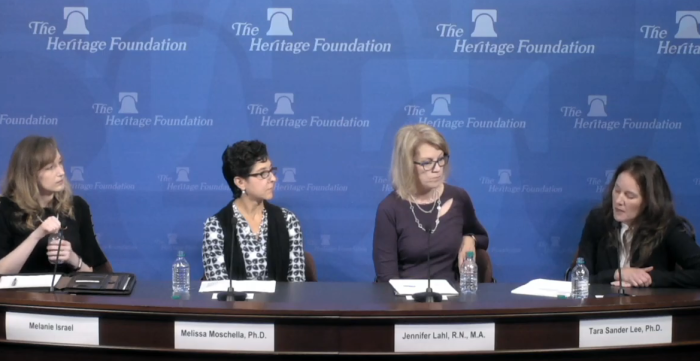Bioethics panel: Why ignoring ethics yields horrors, abuses; media deceives about human costs

WASHINGTON — A group of prominent bioethicists are warning about the grave human harms that result when sound ethics in the practice of science are either ignored or manipulated in pursuit of innovation.
In a panel discussion last week at the Heritage Foundation about why bioethics matters, particularly as it relates to what it means to be human, speakers Tara Sander Lee, Jennifer Lahl and Melissa Moschella opined on the dangers of an ends justifying the means approach to science.
The women — all professionals with backgrounds in bioethics, medical science and philosophy — spoke of the harms inherent in such things as three-parent embryos, surrogacy, reproductive technology, gene editing, and embryonic stem cell research, and highlighted the deception that routinely frames these issues in major news outlets.
Lee, senior fellow and director of Life Sciences at the Charlotte Lozier Institute, said during Q&A — in response to a question from The Christian Post about why the harms are not more visible to the average American — that a significant issue is transparency within the scientific community.
"A lot of times people see how cool the science is but they're failing to educate the public and explain to them what was actually done in the process to get to that [scientific discovery], what materials were used in that process. That's a key part of information that's missing, not only to the public but to the scientists themselves."
During her presentation Lee highlighted the world's first ever human-monkey hybrid that was grown in a laboratory in China, CRISPR gene editing technology, and the research done on "humanized mice," which utilizes tissue obtained from aborted human fetuses.
"There are a lot of scientists, especially in training that are often pressured to use materials or because there is a lack of transparency, they don't even really know what they're using," Lee said.
Media coverage of new-fangled reproductive technologies often hides the harmful impact on actual people, noted Lahl, a documentary filmmaker and founder of the Center for Bioethics and Culture Network. To counter their celebratory narrative, Lahl makes films to tell the stories of women who have been damaged by the fertility industry.
"We can't get the media, overwhelmingly, especially the mainstream media, to present the negative, the downsides," she said.
"You see Kim Kardashian on the cover of People magazine because they just had their next baby through commercial surrogacy. You don't ever see a picture of the surrogate mother and hear how she was treated. Most of these surrogates who serve for these very high-profile, wealthy couples don't even know who they're carrying a baby for. They're bound to anonymity, they're carrying a baby for someone who doesn't want you to know who they are."
Thus, bioethicists and others who care about exposing the harms have to rely on alternative means to get the public up to speed, she noted.
"Most people, left-right, religious-nonreligious, they just think this is all great, it's progress, it's scientific advancement, it's developing cures, it's helping somebody have a child. And that's all that they're hearing," Lahl lamented.
Melissa Moschella, professor of philosophy at The Catholic University of America concurred.
"Accurate information and accurate reporting is extremely helpful," she said, commenting on how for years the coverage on embryonic stem cells — now largely a debate of the past due to the development of induced pluripotent stem cells — was inflated, presented as though such scientific research was the key to important medical breakthroughs.
"In the heat of the debate about the use of embryos for stem cell research, there was all this hype about all the diseases that were going to be cured as a result of it. And what has been found is that by and large, the actual clinical trials, the actual cures have come not from embryonic stem cells but from adult stems cells or from induced pluripotent stem cells," Moschella elaborated.
She added, noting that scientists engage in this hype in order to get funding for their projects: "Good science and progress in science, even in terms of the consequences in the outcomes went along with the ethical science and there was just a lot to false promise in the use of embryos for research."
"It's helpful to put a human face on these things. It can seem just very abstract to say, 'oh you know, the dignity of the person' but when you put somebody face to face with somebody who was exploited by this process, or a now 20-something-year-old who was conceived with the sperm of an anonymous donor and who just feels really confused about identity, robbed of half of their biological heritage, robbed of important medical information that they ought to be able to know about themselves ... when you give these people faces that then really helps to bring it home, that there are real human harms and human costs."





























